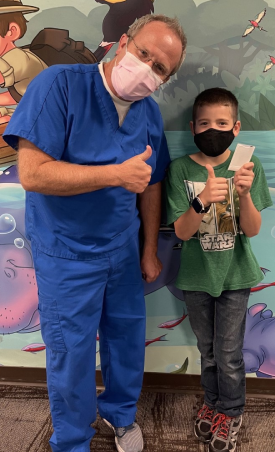One of the most common questions parents ask is, “When should my child have their first dental visit?” This milestone moment sets the foundation for a lifetime of healthy oral habits and positive dental experiences. At Great Falls Pediatric Dentistry & Orthodontics, our certified pediatric specialists understand the importance of early dental care and help families in Great Falls and Havre, Montana, establish proper oral health routines from the very beginning.
The timing of your child’s first dental visit is crucial for preventing future dental problems and creating positive associations with dental care. Understanding the recommended guidelines and what to expect during that initial appointment can help both you and your child feel confident and prepared.
The Official Recommendation: By Age One or Within Six Months of First Tooth
The American Academy of Pediatric Dentistry and the American Dental Association both recommend that children have their first dental visit by their first birthday or within six months of their first tooth appearing, whichever comes first. This “first tooth, first birthday” rule has become the gold standard in pediatric dental care.
Most children get their first tooth between 4-7 months of age, which means the first dental visit should typically occur between 6-12 months of age. This early intervention allows our pediatric dentists at Great Falls Pediatric Dentistry to monitor proper tooth development, assess oral health risks, and provide parents with essential guidance on caring for their baby’s emerging teeth.
Early dental visits are primarily educational and preventive rather than treatment-focused. The goal is to establish a dental home, educate parents about proper oral hygiene techniques, and identify any potential issues before they become serious problems.
Why Early Dental Visits Matter for Your Child’s Future
Starting dental care early provides numerous benefits that extend far beyond just checking teeth. Early dental visits help establish your child’s comfort level with dental environments and create positive associations that can last a lifetime.
During the first year of life, babies are developing their oral habits, and this is the ideal time to address issues like prolonged bottle feeding, pacifier use, and thumb sucking. Our experienced team at Great Falls Pediatric Dentistry & Orthodontics can provide guidance on how these habits might affect your child’s developing teeth and jaw structure.
Preventing Early Childhood Caries
One of the most important reasons for early dental visits is preventing Early Childhood Caries (ECC), formerly known as “baby bottle tooth decay.” This condition can affect children as young as 12 months and can cause significant pain and dental problems if left untreated.
Early dental visits allow our pediatric specialists to educate parents about proper feeding practices, appropriate fluoride use, and effective cleaning techniques for baby teeth. We can also assess your child’s cavity risk and recommend appropriate preventive treatments if necessary.
What Happens During Your Baby’s First Dental Visit
Many parents wonder what actually happens during a first dental visit for such a young child. At our Great Falls and Havre locations, we’ve designed our first visit experience to be comfortable, educational, and stress-free for both babies and parents.
The first dental visit is often called a “well-baby checkup” for the mouth. Your child will likely sit on your lap during the examination, creating a sense of security and comfort. Our gentle approach helps babies feel safe while allowing us to thoroughly examine their oral development.
Initial Assessment and Examination
During the first visit, we perform a comprehensive oral examination that includes checking for proper tooth development, examining the gums and soft tissues, and assessing the overall oral health environment. We look for signs of tooth decay, examine the bite relationship as teeth emerge, and evaluate any habits that might affect oral development.
Our pediatric dentists also assess your baby’s jaw development, tongue function, and swallowing patterns. These factors all contribute to proper oral development and can help us identify potential issues early when they’re easier to address.
Parent Education and Guidance
A significant portion of the first dental visit focuses on parent education. We provide detailed guidance on proper oral hygiene techniques for babies, including how to clean gums before teeth emerge and how to brush baby teeth once they appear.
We discuss feeding practices that promote oral health, including the timing of weaning from bottles and sippy cups. Our team also addresses common concerns about teething, appropriate pacifier use, and the role of fluoride in your baby’s oral health routine.
Age-Specific Milestones and Dental Care Needs
Understanding your child’s developmental milestones can help you provide appropriate oral care at each stage. Different ages require different approaches to dental care, and our team adapts our recommendations based on your child’s individual development.
Birth to 6 Months: Pre-Tooth Care
Even before teeth appear, oral care is important. We recommend gently wiping your baby’s gums with a soft, damp cloth after feedings to remove bacteria and establish a routine. This early care helps prepare your baby for tooth brushing once teeth emerge.
During this stage, we also discuss feeding practices that promote oral health, including breastfeeding benefits and proper bottle-feeding techniques that reduce the risk of tooth decay.
6-12 Months: First Teeth Emergence
Most babies get their first teeth during this period, making it the ideal time for the first dental visit. Once teeth appear, gentle brushing with a soft-bristled infant toothbrush and a tiny amount of fluoride toothpaste becomes important.
We provide demonstrations on proper brushing techniques and discuss the transition from exclusive milk feeding to introducing other foods and beverages that can affect oral health.
12-24 Months: Establishing Routines
By the first birthday, most children have several teeth and should have established regular dental care. This is when we typically recommend scheduling regular checkups and cleanings every six months.
During this stage, we focus on establishing good oral hygiene routines, addressing any developing habits that might affect oral health, and providing guidance on age-appropriate nutrition for healthy teeth.
2-3 Years: Building Independence
Toddlers begin showing interest in brushing their own teeth, though they still need significant help and supervision. We teach both parents and children age-appropriate techniques and make recommendations about when children can begin taking more responsibility for their oral care.
This is also the age when many children experience their first taste of sugary snacks and beverages, making education about healthy food choices particularly important.
Common Concerns and Questions About First Dental Visits
Many parents have concerns about bringing such young children to the dentist. Understanding what to expect can help alleviate anxiety and ensure a positive experience for everyone involved.
“My Baby Doesn’t Have Many Teeth Yet”
Even if your child only has one or two teeth, the first dental visit is still valuable. We can assess proper oral development, provide preventive care recommendations, and establish a baseline for future visits. Early visits also help your child become familiar with our office environment.
“My Child Is Too Young to Cooperate”
We specialize in working with very young children and understand that cooperation looks different at different ages. For babies and toddlers, simply allowing us to look in their mouth is considered successful cooperation. We use gentle techniques and work at your child’s pace.
“What If My Child Cries or Gets Upset”
It’s completely normal for young children to cry or show distress during dental visits. Our experienced team is trained to work with upset children and can often complete necessary examinations even when children are crying. We prioritize creating positive experiences and building trust over time.
Special Considerations for High-Risk Children
Some children may need their first dental visit earlier than the standard recommendation due to specific risk factors. Our pediatric specialists can assess whether your child might benefit from earlier intervention.
Medical Conditions That May Require Earlier Care
Children with certain medical conditions, developmental delays, or medications that affect oral health might need dental care earlier than typical recommendations. We work closely with pediatricians and other healthcare providers to coordinate comprehensive care.
Family History Considerations
If there’s a strong family history of early tooth decay or other oral health problems, we might recommend earlier or more frequent dental visits. Genetic factors can influence cavity risk, and early intervention can help prevent problems.
Feeding and Habit Concerns
Children with prolonged bottle feeding, frequent night feeding, or other habits that increase cavity risk might benefit from earlier dental guidance. We can work with families to modify these habits in ways that protect oral health while meeting the child’s developmental needs.
Creating Positive Dental Experiences from the Start
One of our primary goals at Great Falls Pediatric Dentistry & Orthodontics is creating positive dental experiences that set the foundation for a lifetime of good oral health. The first dental visit plays a crucial role in establishing these positive associations.
Our Child-Friendly Approach
Our offices in Great Falls and Havre are specifically designed to be welcoming and comfortable for children. We use age-appropriate language, gentle techniques, and positive reinforcement to help children feel safe and secure.
We understand that every child is different and adapt our approach based on individual temperaments and developmental stages. Some children are naturally curious and cooperative, while others may be more cautious or anxious.
Building Trust Over Time
We view the first dental visit as the beginning of a long-term relationship with your family. Our goal is to build trust gradually, allowing children to become comfortable with our team and office environment at their own pace.
Each visit builds on the previous one, with children typically becoming more comfortable and cooperative as they develop familiarity with our routines and staff.
Preparing Your Child for Their First Dental Visit
While babies and very young toddlers don’t need extensive preparation for dental visits, there are things parents can do to help ensure a positive experience.
Before the Visit
Read books about going to the dentist or play pretend dentist games at home to familiarize your child with the concept. Keep discussions positive and avoid using words that might create anxiety, such as “hurt,” “pain,” or “shot.”
Schedule the appointment at a time when your child is typically well-rested and cooperative. Many young children do better with morning appointments when they’re fresh and alert.
During the Visit
Bring comfort items like a favorite stuffed animal or blanket if they help your child feel secure. Stay calm and positive, as children often pick up on parental anxiety.
Be prepared to hold your child during the examination if needed. This physical closeness often helps young children feel more secure and allows us to complete the examination more effectively.
After the Visit
Praise your child for their cooperation, regardless of how the visit went. Focus on the positive aspects of the experience and avoid apologizing for any crying or resistance, which is normal behavior for young children.
Ongoing Dental Care After the First Visit
The first dental visit establishes the foundation for ongoing oral health care. Understanding what comes next helps parents maintain momentum in establishing good dental habits.
Regular Checkup Schedule
After the first visit, we typically recommend regular checkups and cleanings every six months. This frequency allows us to monitor development, provide ongoing preventive care, and address any concerns before they become serious problems.
Some children with higher cavity risk or other oral health concerns might need more frequent visits. We work with each family to determine the optimal schedule based on individual needs.
Evolving Care Needs
As children grow, their dental care needs evolve. What starts as simple examinations and parent education gradually expands to include professional cleanings, fluoride treatments, and other preventive services.
We also begin teaching children age-appropriate oral hygiene skills and involving them more actively in their dental care as they develop the necessary fine motor skills and understanding.
When Delays Might Be Necessary
While early dental visits are generally recommended, there are some circumstances where delaying might be appropriate. Our pediatric dentists can help families navigate these situations.
Medical Complications
Children with serious medical conditions or those who are medically fragile might need to delay routine dental care until they’re medically stable. We work with pediatricians and other specialists to determine appropriate timing.
Extreme Anxiety or Behavioral Concerns
While some anxiety is normal, children with extreme anxiety or certain behavioral challenges might benefit from delayed introduction to dental care or modified approaches. We can provide guidance on preparation techniques and alternative approaches.
Access and Scheduling Challenges
We understand that families sometimes face practical challenges in accessing dental care. Our offices in Great Falls and Havre offer flexible scheduling options, and we work with families to overcome barriers to care.
Emergency Dental Situations in Young Children
Even very young children can experience dental emergencies that require immediate attention. Understanding when to seek emergency care helps parents respond appropriately to urgent situations.
Common Dental Emergencies in Young Children
Dental trauma from falls, tooth pain from decay, and infections can all occur in young children. Our practice offers 24/7 emergency services to ensure families have access to care when urgent situations arise.
If your child experiences a dental emergency, call our emergency line at (406) 205-3586. Our on-call team can provide immediate guidance and arrange appropriate care.
Prevention Through Early Care
Many dental emergencies in young children can be prevented through early intervention and proper preventive care. Regular dental visits allow us to identify and address potential problems before they become emergencies.
The Role of Prevention in Early Childhood Dental Care
Prevention is the cornerstone of pediatric dental care, and it begins with the first dental visit. Understanding the various preventive strategies available helps parents make informed decisions about their child’s oral health care.
Professional Preventive Services
Depending on your child’s age and risk factors, we may recommend various preventive treatments such as fluoride applications, dental sealants for permanent teeth, or other protective measures.
These professional preventive services work in conjunction with good home care to provide comprehensive protection against tooth decay and other oral health problems.
Home Prevention Strategies
We provide detailed guidance on home prevention strategies, including proper brushing and flossing techniques, appropriate fluoride use, and dietary recommendations that support oral health.
Education about preventing dental injuries through appropriate safety measures and avoiding harmful habits is also an important component of our preventive approach.
Conclusion: Starting Your Child’s Dental Journey Right
The recommended age for your child’s first dental visit—by age one or within six months of the first tooth—represents an investment in their long-term oral health and overall well-being. At Great Falls Pediatric Dentistry & Orthodontics, we’re committed to making this first experience positive and educational for both children and parents.
Our experienced pediatric dental team, led by Dr. Kevin Rencher, Dr. Nate Stevenson, and Dr. Tedi Howell, understands the unique needs of young children and specializes in creating comfortable, stress-free dental experiences. We believe that starting dental care early, with the right approach, sets the foundation for a lifetime of healthy smiles.
Don’t wait until problems develop—proactive dental care beginning in infancy provides the best opportunity for preventing oral health issues and establishing positive dental experiences. Contact Great Falls Pediatric Dentistry & Orthodontics today to schedule your child’s first dental visit and begin their journey toward optimal oral health.
Early intervention, combined with ongoing preventive care and parent education, gives your child the best possible start for a lifetime of healthy teeth and positive dental experiences. Our team is here to guide and support your family every step of the way.
Ready to Schedule Your Child’s First Dental Visit?
Call (406) 205-3586 to schedule your child’s first dental visit at our Great Falls or Havre location. Our gentle, experienced team is ready to welcome your family and help establish healthy dental habits from the very beginning.



